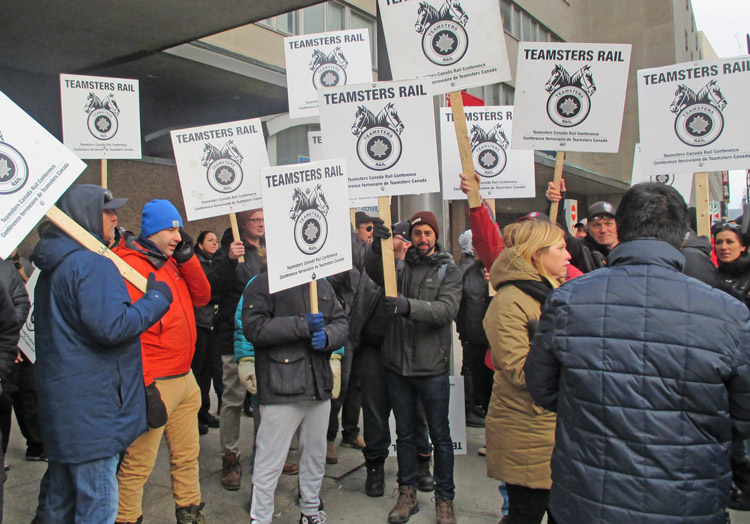MONTREAL —Canada’s two major railroads — Canadian National and Canadian Pacific Kansas City — both filed a “notice of dispute” with the federal government Feb. 16, making it clear that the rail bosses intend to wage a combined fight against the 9,300 members of the Teamsters Canada Rail Conference, who are fighting for safer working conditions and livable schedules. This includes railroad conductors, locomotive engineers, yard workers and 90 rail traffic controllers on the Canadian Pacific Kansas City.
Workers will hold strike votes at both railways from April 8 to May 1. A strike could legally be called by the union May 22. Joint strikes were carried out by Canadian National and Canadian Pacific workers in 1966 and 1950. In the 1950 strike, 138,000 workers from the different rail trades fought and won the 40-hour workweek.
“The issue is simple — safety on the job,” Eugen Bernard, a train conductor at CN in Montreal for the past nine years, told the Militant. “They want to make as much money as possible and force us to work as often as possible.”
“Each year, Canada grapples with hundreds of derailments, fires, explosions, collisions and cases of runaway trains. Dangerous goods are often involved in these accidents,” Teamsters Canada President Francois Laporte wrote last July marking the 10th anniversary of the Lac-Megantic disaster, when a parked train rolled down a hill, exploded and set the downtown area on fire, killing 47 people. Since Lac-Megantic, “21 railway employees died and 110 were seriously injured on the job. … [F]atigued railroaders across this country are operating trains when they should be resting.”
Both Canadian Pacific and Canadian National bosses have sent their proposals directly to the members, bypassing the union. “The Employer’s purpose in sending these communications was to undermine the viability of the Union in the eyes of its membership,” the Teamsters Conference responded, omitting “crucial information” and failing to “describe all the radical changes it seeks to obtain,” which would destroy “your working conditions.”
“I think they’re trying to get a majority vote from the younger guys by offering them big money now, and not to think about what that will mean in the future,” said Jourdain Dumont, a conductor at Canadian National in Montreal for the past two years. CN’s letter claims it is offering a raise of 20% on average for each worker, without pointing out that means a wage cut for many, since rail workers get paid different rates for different jobs.
“It’s enticing to get that much more money. That’s a big jump without having to wait 10 years” to be able to hold the highest paying jobs, he said.
“As it is right now, we’re already tired when we work 10 hours, and on top of that they take a long time to get us back home. Now they want us to work 12 hours and be off for 10, which would be a qualitative deterioration of our work-life balance,” a conductor for Canadian National from Melville, Saskatchewan, who asked that his name not be used for fear of reprisal from the company, told the Militant.
“If we go on strike, the government might force us back to work under CN’s conditions,” Bernard said. “But we need to understand we have power. If we are weak, we will be slaves for life.”
He pointed to the example of the 1942 Betteshanger Miners Strike in Kent, England. In the middle of World War II, facing draconian anti-strike legislation, the miners decided to walk out over dangerous working conditions and the mine owners holding back their wages. “One thousand eighty-five workers were fired, and many were jailed, but by fighting they ended up winning,” he said. “And everyone was pardoned.”
“Working people and their unions, as well as farmers and other small producers, have a big stake in supporting the rail workers fight for safety on the job,” Katy LeRougetel, Communist League candidate in the upcoming by-election in LaSalle-Emard-Verdun, told the Militant. “It is also a vital fight for the safety of the hundreds of thousands that live close to the tracks and face the risks of another Lac-Megantic everyday.
“The labor movement as a whole needs to defend the rail workers’ right to strike. It’s the key tool workers have to fight for better wages and working conditions and for our rights,” she added. “And all working people need to prepare to back them with widespread labor solidarity.”


